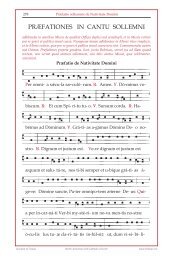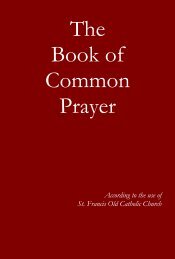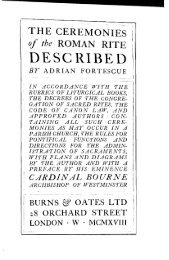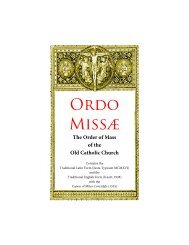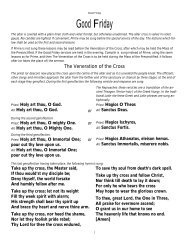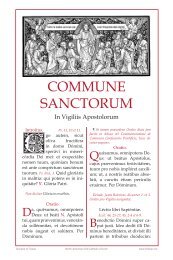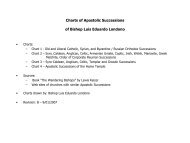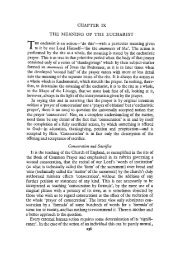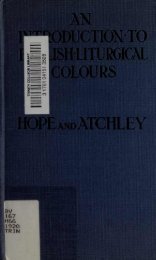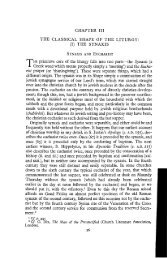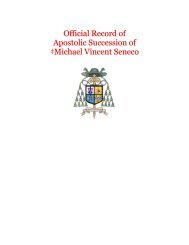Eucharist and Lord's Supper
Eucharist and Lord's Supper
Eucharist and Lord's Supper
Create successful ePaper yourself
Turn your PDF publications into a flip-book with our unique Google optimized e-Paper software.
EUCHARIST AND LORD'S SUPPER 101<br />
(I) The conditions which dictated the separation were much more likely<br />
to arise in gentile churches with their pagan background than among jewish<br />
christians. We have seen that they arose very quickly at Corinth, despite<br />
the fact that S. Paul had personally instructed the original converts there<br />
on the meaning of the eucharist, <strong>and</strong> had exercised supervision over that<br />
church afterwards. What of gentile churches which had no such advantages-those,<br />
say, founded by converts ofhis converts? Christianity spread<br />
with extraordinary swiftness among gentiles in the years A.D. 40-60. The<br />
need for such a reform might become pressing <strong>and</strong> general in quite a short<br />
time. (2) The separation, whenever it was made, was made with great<br />
delicacy <strong>and</strong> considerable knowledge of jewish customs, by men who<br />
cherished the jewish past. One has only to consider such things as the<br />
retention of the host's invitation to offer the berakah <strong>and</strong> the guests' assent<br />
before the eucharistic prayer; or the retention ofthe bread-breaking at the<br />
agape despite its duplication of that at the eucharist, because this was the<br />
invariable jewish grace before meals; while the 'cup of blessing', the invariable<br />
jewish accompaniment of the berakah at a chaburah meal, was<br />
not retained at the agape because the latter was not in the same sense 'the'<br />
chabUrah rite for the christians, <strong>and</strong> the berakah itself had been transferred<br />
to the eucharist. These things speak for themselves. They were done by<br />
jews, <strong>and</strong> accepted by all at a time when the gentile churches still looked to<br />
jewish leaders in their new faith. That stage did not last long after A.D. 70<br />
so far as we can see. (3) There is the further consideration ofthe universal<br />
<strong>and</strong> unquestioning acceptance of the 'four-action shape' in the second<br />
century, when most things were being questioned by the scattered churches,<br />
without oecumenical leaders, without generally accepted christian scriptures<br />
<strong>and</strong> with only undeveloped st<strong>and</strong>ards of orthodoxy of any kind.<br />
There was then no tradition whatever of a 'seven-action shape'-such as<br />
the N.T. documents, already in circulation <strong>and</strong> reverenced though not yet<br />
canonised, proclaimed as original. (4) There are the further indications,<br />
very slight in themselves, that when Matt. <strong>and</strong> Mark were written (A.D.<br />
65-80) the exact relation of the eucharist to a meal was only of academic<br />
interest to christians.<br />
It is impossible to do more than indicate the probabilities-perhaps only<br />
the possibilities-of the case. But these do point back to the apostolic age<br />
itself as the period of the formation ofthe 'four-action shape' of the liturgy<br />
-after the writing of I Cor. but before the writing of the first of our gospels.<br />
And if we must look for a place whence the new separate rite of the<br />
'eucharist', <strong>and</strong> the new name for it, spread over all the christian churchesthis<br />
is much more hazardous-there is Rome, the church of Peter the<br />
apostle of the circumcision <strong>and</strong> of Paul the apostle of the gentiles, in the<br />
capital <strong>and</strong> centre of the world, which 'taught others', as Ignatius said, <strong>and</strong><br />
had 'the presidency of charity'. With a strong jewish minority in a Greekspeaking<br />
church, the need for Greek equivalents to berakah <strong>and</strong> chaburah



